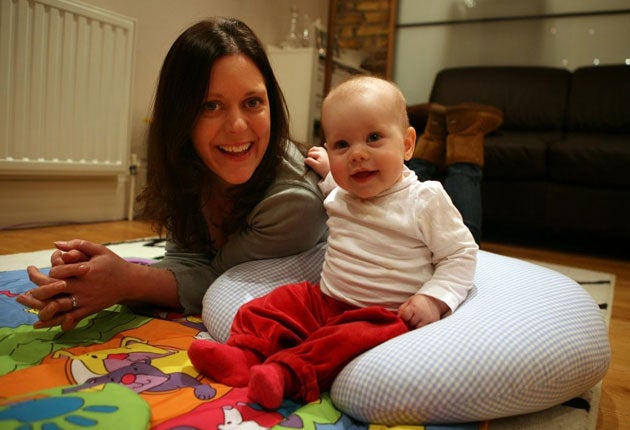Questions over jab that has spared thousands
Solvent used in vaccine preparation could be contamination source

Your support helps us to tell the story
From reproductive rights to climate change to Big Tech, The Independent is on the ground when the story is developing. Whether it's investigating the financials of Elon Musk's pro-Trump PAC or producing our latest documentary, 'The A Word', which shines a light on the American women fighting for reproductive rights, we know how important it is to parse out the facts from the messaging.
At such a critical moment in US history, we need reporters on the ground. Your donation allows us to keep sending journalists to speak to both sides of the story.
The Independent is trusted by Americans across the entire political spectrum. And unlike many other quality news outlets, we choose not to lock Americans out of our reporting and analysis with paywalls. We believe quality journalism should be available to everyone, paid for by those who can afford it.
Your support makes all the difference.Meningitis is a potentially dangerous inflammation of the membranes of the brain and spinal cord and can be caused by a range of viruses, bacteria and even drugs. It is classed as a medical emergency because it can kill very quickly.
The most common symptoms of meningitis are headaches and neck pain associated with fever, confusion and an inability to cope with bright light or loud noises. A rash can indicate infection with one of the range of bacteria that can cause the inflammation. The meningitis C vaccine is designed to protect against the "C" class of bacteria known to cause the condition and is made from inactivated proteins extracted from the Neisseria meningitidis bacterium. It does not protect against meningitis B.
Like other vaccines, the meningitis C vaccine works by stimulating the production of disease-fighting antibodies which, once primed, can be quickly marshalled in defence of the body when a real infection takes place. Since its introduction in 1999, the meningitis C vaccine has proved successful in reducing the number of people suffering from the illness. About 13 million children were immunised during the first year of the campaign.
Prior to the introduction of the vaccine, group C meningococcal disease was the second most common cause of meningitis, accounting for 40 per cent of cases. Since then, the number of cases of meningitis C has fallen by more than 95 per cent.
There are two meningitis C vaccines used in Britain. One is made by Wyth, which is not connected with the current recall by the Medicines and Healthcare products Regulatory Agency (MHRA), and the other is the Novartis product Menjugate, which could be contaminated with the hospital-acquired infection Staphylococcus aureus – which is the microbe behind MRSA.
Two batches of the Novartis vaccine could be contaminated with the bacterium. Although standard tests proved negative for Staphylococcus, two non-standard tests carried out to determine whether it was better to send the vaccine by air rather than by road from Italy proved positive for the bacterium. The problem seems to stem from the use of a solvent called aluminium hydroxide used in the preparation of the vaccine which could have been contaminated with Staphylococcus aureus, according to Novartis.
The vaccine was tested extensively before its introduction and is considered to be safe by the regulatory agencies. After it was licensed in the UK, it has been monitored regularly for safety and adverse effects are monitored through the yellow card scheme of reporting used by GPs.
The MHRA said that Novartis was investigating the root cause of the problem, but there was no evidence that other batches of the aluminium hydroxide solvent used in the preparation were contaminated. The agency is also keen to reassure parents that there is no reason for children to be at risk from the vaccine but if they are concerned they should consult their GPs.
The Department of Health said last night that the batches of vaccine being recalled have passed the standard sterility tests carried out in the UK and the recall is purely a precautionary measure.
Case study: 'The worst thing is that this is another scare for parents'
Ciar Neale's seven-month-old daughter, Iris, was vaccinated against meningitis C earlier this year. But the 32-year-old from north London said that this latest scare would make other mothers think twice.
"I'm a big believer in vaccination," she said. "I think parents have a responsibility to their child and to other children to protect against diseases. But if there is something wrong with the vaccine I'm not so sure I'd feel the same way.
"If there is a problem with a particular vaccine I do not think any parent would want to put a child at risk. Some parents already see vaccination as a risk and they will not want to add to that.
"Vaccinations are quite an emotive subject for parents. When I took Iris to get her injections she got quite upset and I felt terrible for letting someone stick a needle in my daughter and hurt her. I don't know how I'd have felt if someone told me that by allowing her to be vaccinated I could have actually done more harm than good.
"I think the worst thing is that this is another scare for parents. The Measles Mumps and Rubella (MMR) story created a scare which saw the return of measles – a really horrible disease. It is a great shame that something like this could cause parents to decide not to have their child vaccinated."
Mark Hughes
Join our commenting forum
Join thought-provoking conversations, follow other Independent readers and see their replies
Comments